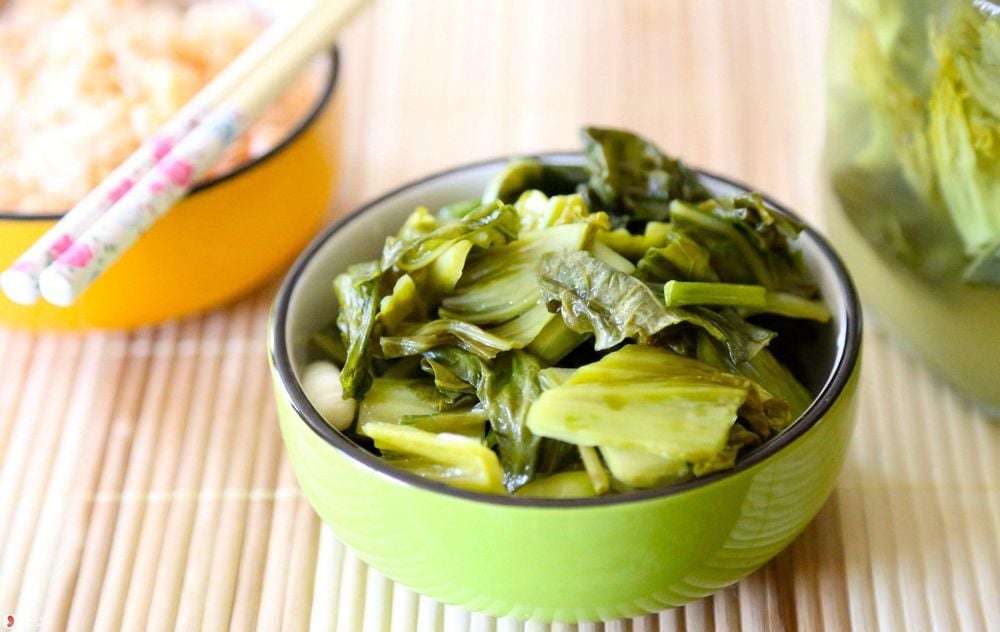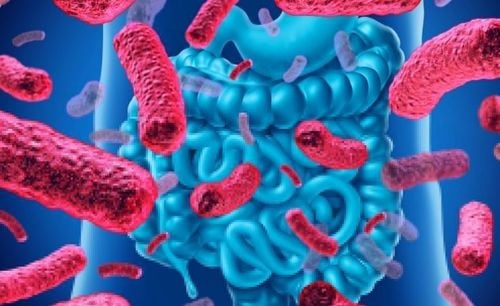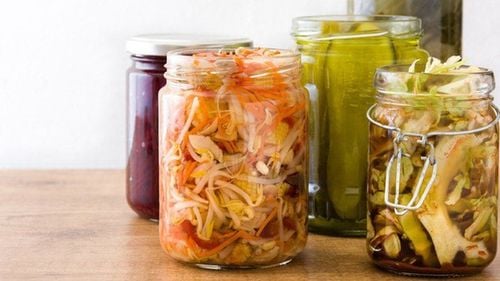Pickling is a food preservation technique that has existed for a long time. Almost all foods can make pickles, but pickles from vegetables are common. This is a form of preserving certain vegetables in fermented brine containing beneficial bacteria.
Fermented pickles have more health benefits than other types of pickles. Both pickles and fresh vegetables are rich in vitamins such as vitamin K and vitamin A. So is it good to eat pickled vegetables? Read the following information to learn more about the health benefits of pickles, as well as how to make pickles at home.
Many people may have heard about the health benefits of pickles and pickle juice such as helping lose weight regulate blood sugar, or even prevent cancer. However, it is a warning that people who eat too many pickles are likely to experience stomach cancer due to their high sodium content.
Cucumbers originated in India, where they have been eaten before they were written in history. Christopher Columbus brought cucumbers to the Americas in the 15th century. Meanwhile, people began pickling them about 4,000 years ago as a way to preserve and extend their lives for transportation.
1. Nutritional content of pickled cucumbers
The nutritional information of pickles varies depending on the type, but their general characteristics are very rich in Sodium. Typically, 35 grams of pickles contain several nutrients with the following content:
- Energy: 4 Kcal.
- Carbohydrates: 0.8 grams.
- Fiber: 0.3 grams.
- Sodium: 283 milligrams.
- Protein: 0.2 grams.
- Sugar: 0.4 grams.
This nutrition information is from the United States Department of Agriculture in conjunction with the Agricultural Research Service and Nutrient Data Laboratory.

2. How Pickles Fermented
Fermentation is one of the most common methods of pickling, but not all pickles are fermented. When fruits and vegetables ferment, healthy bacteria naturally break down sugar. This process creates the sour taste of fermented pickles. The good bacteria in pickles break down lactose. These bacteria, also known as probiotics, help preserve foods and have many health benefits.
When pickles are not fermented, vinegar makes the pickles go rancid. Vinegar itself is produced through fermentation, but only raw, unpasteurized vinegar, such as raw apple cider vinegar, retains parts of the environment that provide that good bacteria. Most pickles sold in grocery stores are unfermented, vinegar-based pickles. In these cases, the cucumbers are pickled with vinegar and spices. Pickles can also be made at home with relative ease.
3. Health Benefits of Pickles
Eating fermented foods has been shown to have a wide range of health benefits, like reducing insulin resistance and inflammation. Sauerkraut, one of the most popular fermented foods worldwide, has been shown to have cancer-preventing benefits. Regular consumption of pickles may also reduce the risk of obesity. Fermented pickles are also rich in beneficial bacteria called probiotics, which are important for gut health.
Pickles that are not fermented still provide benefits due to the vinegar, spices, and cucumbers they contain. Even today, drinking pickle juice has become a trend because of the benefits it provides in preventing muscle cramps, weight loss, diabetes, etc. Pickle juice is also a favorite of people on the ketogenic diet, who may need to supplement more sodium to balance electrolytes in the body.
Pickles increase the amount of an antioxidant called beta-carotene. Antioxidants naturally found in all fruits and vegetables help neutralize free radicals. Free radicals are unstable chemicals that form naturally in the body and have been linked to problems such as heart disease and cancer.
Any food that is processed at high temperatures can break down heat-sensitive nutrients, including antioxidants. Raw pickles and fruits help preserve their antioxidant content.
Some athletes use pickle juice after exercise to quickly replace lost electrolytes. A study found that pickle juice may be slightly better than water at reducing muscle cramps during exercise. Additionally, pickle juice, especially vinegar, may help stabilize your blood sugar levels, which is beneficial for individuals who are at risk for diabetes.

4. Sodium in pickles
A major drawback of pickles is that they are too salty. Just one large pickle contains more than two-thirds of the recommended daily intake of sodium for an adult.
Too much salt in the diet can raise blood pressure, which increases the risk of heart attack, stroke, diabetes, and kidney disease. Sodium can also leach calcium from bones, which weakens bones and increases the risk of fractures.
Most pickle recipes call for salt, and salt accounts for about 5% of the total. A small bowl of pickles contains about 600 mg of sodium, which is more than a quarter of the recommended daily limit. In addition to being a major concern for most people with high blood pressure, pickled foods that are too salty can increase the risk of stomach cancer. A 2015 study found that along with beer and liquor consumption, high-salt foods were also associated with stomach cancer. One way to control the amount of sodium in pickles is to rinse them under clean running water before cooking.

5. How to pickle
Salting, either by fermenting or brining, has been used for thousands of years to preserve food after it has been harvested. Typically, pickling recipes include salt, white vinegar, and a few other spices, such as dill and mustard seeds.
In parts of Asia, oil is also used extensively in pickling. While cucumbers are most popular in North America, all kinds of fruits and vegetables, and even meat, are pickled. People in these places can also pickle cucumbers, carrots, cauliflower, beets, cabbage, etc. All you need to do is pour vinegar and hot brine over them, let them cool, cover them, and let them soak for a few days in the refrigerator. Homemade pickles have very unique flavors and are tasty. If you are neither sensitive to salt nor hypertensive, you can make your jar of pickles to enjoy the health benefits and unique flavors they bring.
Pickled cucumbers and all types of pickles in general, not only have a special flavor and are suitable side dishes but also bring many health benefits to humans. Pickles contain a lot of vitamins and minerals in their vinegar brine as well as being an excellent source of antioxidants, which can neutralize free radicals, slow down the aging process, and reduce the risk of cardiovascular diseases. The biggest drawback of pickles is that they contain too much sodium. However, this can be eliminated if the pickles are washed thoroughly before processing.
To arrange an appointment, please call HOTLINE or make your reservation directly HERE. You may also download the MyVinmec app to schedule appointments faster and manage your reservations more conveniently.
References: healthline.com, webmd.com
To arrange an appointment, please call HOTLINE or make your reservation directly HERE. You may also download the MyVinmec app to schedule appointments faster and manage your reservations more conveniently.


